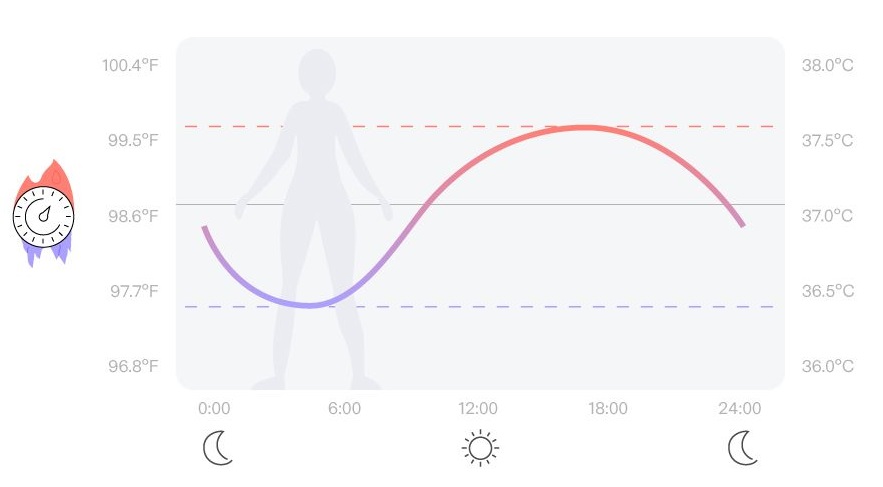- Le corps dispose d’un thermostat qui maintient la température interne dans une fourchette idéale, en la régulant par des mécanismes comme la dilatation des vaisseaux sanguins lorsqu’il fait trop chaud, ou leur rétrécissement lorsqu’il fait trop froid.
- La température corporelle fluctue d’un jour à l’autre en fonction du rythme circadien et de facteurs comme l’alimentation, l’exercice physique et les hormones. Ces variations sont un bon indicateur de l’état de santé général et du niveau de préparation.
- En surveillant votre température interne nocturne avec Oura, vous pouvez identifier des modèles importants qui vous aideront à comprendre comment le stress, la maladie et d’autres facteurs influencent la capacité de votre corps à récupérer et à maintenir l’équilibre.
Votre organisme dispose d’un thermostat interne dont le but est de maintenir votre température aussi proche que possible de votre température cible. La stabilité de ce nombre, connu sous le nom de température corporelle interne, reflète la capacité de votre corps à se réchauffer ou à se refroidir afin de vous maintenir dans une fourchette idéale.
Chaque jour, votre corps régule votre température en fonction de votre rythme circadien. Ainsi, votre température augmente le matin et baisse le soir. Pourtant, de nombreux facteurs comme l’alimentation, l’exercice physique, les hormones, ont un impact sur votre température. Pour maintenir un bon équilibre, votre corps doit donc constamment faire quelques ajustements :
- Quand vous avez trop chaud, votre corps tente de dissiper et d’expulser la chaleur par le biais de la vasodilatation afin de transférer l’excès de chaleur vers la surface de la peau. Une fois que la sudation s’est évaporée et que votre sang a perdu de sa chaleur, votre corps se refroidit.
- Quand vous avez trop froid, votre corps tente d’isoler ou d’emprisonner la chaleur par le biais de la vasoconstriction afin que le sang conserve plus de chaleur interne, et en augmentant votre température par le biais du frisson.
La stabilité de votre température indique la capacité de votre corps à s’autoréguler face à des situations difficiles. Elle indique votre état de récupération, votre niveau de préparation pour la journée, la probabilité que vous tombiez malade, ou des troubles hormonaux.
| Conseil pour nos membres : Surveillez votre température corporelle à l’aide d’Oura. La température est l’un des principaux signes vitaux et un indicateur clé de votre santé. En mesurant la température corporelle toutes les minutes, directement à partir de la peau du doigt, Oura peut saisir une image complète des changements survenant dans le corps. |
Votre température fluctue naturellement

En moyenne, la température corporelle interne d’une personne oscille entre 36,5 et 37,5 °C au cours d’une même journée. La température corporelle n’est pas constante, elle fluctue en fonction du rythme circadien.
En général, cela signifie que votre température corporelle est au plus bas quelques heures avant votre réveil et au plus haut une heure ou deux avant d’aller vous coucher.
La température corporelle interne d’une personne varie généralement d’environ 1 °C entre son point le plus haut et son point le plus bas chaque jour. Si votre température corporelle se situe en dehors de cette fourchette, cela veut dire que votre corps ne parvient pas à s’autoréguler.
C’est à la surface de la peau, où la chaleur du sang et la fraîcheur de l’environnement se rencontrent, que la fourchette de température est normalement la plus vaste.
Votre température cutanée et votre température interne peuvent même aller dans des directions opposées au cours d’une même journée. Par exemple, si votre température interne est trop élevée, votre corps tente de se refroidir par l’évacuation de la chaleur à la surface de la peau. Mais en cas de fièvre, ou après l’ovulation, votre température cutanée et votre température interne augmentent de la même manière.
Avec tous ces changements, il est important de savoir où la température est mesurée avant de comparer des données.
Quels sont les modèles importants ?
Au cours de la journée, votre température varie en fonction de vos mouvements, repas, boissons, interactions sociales et changements de cadre. En raison de la forte variation de température au cours de la journée, pour mesurer votre état de santé global, il est préférable de prendre votre température la nuit lorsque votre corps est dans son état le plus stable.
La nuit, votre température corporelle reflète ce qui s’est passé pendant la journée. Votre corps est-il stressé et en dehors de sa fourchette idéale ou peut-il maintenir la stabilité de votre thermostat ?
Si votre température corporelle se situe en dehors de la fourchette normale, votre corps vous indique qu’il n’arrive pas à se réguler.
Repérez ces modèles dans votre température interne nocturne :
Perturbation du rythme circadien
Le rythme circadien permet à l’organisme de passer de l’état de veille à l’état de sommeil. Ce rythme se traduit par une baisse de la température interne à l’approche de l’heure optimale du coucher et par une hausse juste avant le réveil. N’oubliez pas que la sécrétion de mélatonine aide à déclencher le processus de refroidissement de votre corps et qu’elle peut être facilement perturbée par la lumière bleue.
Si votre température moyenne est nettement plus élevée ou plus basse que la moyenne, ou si elle ne change pas au moment de vous endormir, votre corps est peut-être sous tension et incapable de s’autoréguler pendant la nuit. Si vous vous endormez à une heure différente de la normale, (p. ex. voyage dans un fuseau horaire différent), le rythme de votre température ne sera plus aligné.
Maladies potentielles
Si vous tombez malade, votre température corporelle peut augmenter avant même les premiers signes de fièvre. Bien que les chiffres varient, la fluctuation normale de la température quotidienne est d’environ 1 °C. Si votre température est plus élevée que cette fluctuation, vous êtes probablement en train de tomber malade. Certaines maladies provoquent même de la fièvre. Quoi qu’il en soit, le retour à la normale de votre température est un signe positif de guérison.
| Conseil pour nos membres : Repérez les symptômes avant de tomber malade. Le Détecteur de symptômes d’Oura peut vous aider à détecter les signes annonciateurs d’une maladie, afin que vous puissiez donner la priorité au repos et à la récupération. |
Chaleur interne
Stimuler vos organes peut générer beaucoup de chaleur interne. Si vous mangez ou buvez trop avant d’aller vous coucher, il est possible que votre température reste élevée pendant la nuit. C’est la preuve que votre système digestif fournit trop d’efforts.
Vous pouvez observer une hausse de votre température d’environ 0,5 °C. Être à l’écoute de votre corps peut vous aider à déterminer si l’hyperthermie est due à un facteur que vous pouvez contrôler (p. ex. heure des repas ou literie) ou si elle résulte d’un autre changement corporel (p. ex. bouffées de chaleur ou mélatonine) .
Cycles menstruels
Si vous suivez votre cycle menstruel, vous constaterez que votre température varie en fonction de vos fluctuations hormonales. Cela se traduit généralement par une baisse de la température corporelle pendant la première moitié du cycle menstruel (phase folliculaire), suivie d’une hausse pendant la seconde moitié (phase lutéale). Notez que l’utilisation d’une contraception hormonale peut supprimer les variations mensuelles de température et/ou augmenter votre température moyenne.
| Conseil pour nos membres : Suivez votre cycle menstruel sur Oura à l’aide de Cycle Insights. Vous constaterez peut-être que votre température est plus élevée pendant la phase lutéale. |
À LIRE ÉGALEMENT : Comment utiliser la fonctionnalité Tendances de température d’Oura pour suivre votre cycle
À retenir
Vous pouvez influencer votre température corporelle plus que vous ne le pensez. Certains moines tibétains méditent et augmentent leur température cutanée au point de faire sécher une serviette mouillée sur leur dos. Nous vous recommandons de commencer par ces petites astuces simples :
- Si vous prenez une douche chaude, votre corps se refroidira assez vite après pour indiquer à votre thermostat interne qu’il est l’heure de se coucher.
- En revanche, une douche froide stimule votre système et indique à votre corps de se réchauffer pour rester éveillé.
- Si votre chambre est fraîche, votre corps devra fournir moins d’efforts pour maintenir une température corporelle idéale pendant la nuit. Quelles que soient vos préférences en matière de température, la physiologie et la science indiquent toutes deux que la température idéale de la chambre pendant la nuit est d’environ 18 °C.
Vous en saurez davantage sur votre santé en observant votre température corporelle au quotidien. Commencez à suivre vos tendances et observez les modèles qui ressortent.











